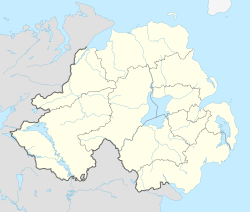User:Blueduck77/Portglenone
Portglenone
Port Chluain Eoghain | |
|---|---|
Town | |
| Coordinates: 54°57′N 6°27′W / 54.95°N 6.45°W | |
| Country | |
| Province | Ulster |
| District | Ballymena Borough |
| County | County Antrim |
| [1] | |
| Time zone | UTC+0 (WET) |
| • Summer (DST) | UTC-1 (IST (WEST)) |
Portglenone (Irish: Port Chluain Eoghain, meaning landing place of Glenone) is a village in County Antrim, Northern Ireland, 14 km (8.5 mi) west of Ballymena, at latitude 54:51:40N and longitude 6:30:46W. It had a population of 1,219 people in the 2001 Census. It lies within the Ballymena Borough Council area. Portglenone is closely associated with the smaller Glenone village (in Magherafelt District Council area) from which it is physically separated by the River Bann.
History
editPortglenone's position on the Bann was an important factor in the growth of the setttlement. The town is the location of two historic fording points at Glenone and Portnakim. In 1197, a castle was built there for Norman invader John de Courcy to protect the crossing points between County Antrim and County Londonderry. The castle makes up a chain of castles wich stretch the length of the Bann from Lough Neagh to the sea. The loaction has had a number of bridges, these have inclued a Timber Briget and two stone bridges, the first built in 1824. The second and current 3-arch basalt bridge was built in 1853, this followed the depening of the River Bann by the Board of Works in 1851.
Church Of Ireland - The Church Of Ireland was erected at the corner of the Ballymena/Townhill Roads soon after 1735 by Bishop Francis Hutchinson and became parish church proper in 1840. | The village Church of Ireland is located at the top of the town
Aughnahoy Chapel - The Aughnahoy Roman Catholic chapel on the Ballymena Road was commenced in 1774 by Father John Cassidy Aughnahoy Chapel
St. Mary's Roman Catholic Church - Aughnahoy Chapel was replaced by St. Mary's Church (A Romanesque gothic building) in 1871. St. Mary's Roman Catholic Church
First Presbyterian Church - The First Presbyterian Church in Main Street was built in 1870-73 by Young and McKenzie in the Gothic style.
SECOND Presbyterian Church - The Townhill Old Church was built about 1832 but became disused after it's congregation was dissolved in 1910 and WAS DEMOLISHED AND PLAQUE ERECTED 1998. The 3rd Presbyterian Church, Townhill Road which was founded in 1839 had it's facade remodelled in 1847 and the main church was rebuilt after a fire in 1965, and in a Romanesque style with a mockround tower.
Portglenone Cistercian Monastery
Events
edit- The Gig 'n the Bann is a local cross-community Music and Dance Festival which has been held very year since 2001. It takes it's name from the River Bann which flows through the village. [2]
Places
edit- Portglenone Forest Park, just outside the village, is classified as an ‘Ancient Woodland’, and has well marked nature trails, with the River Bann flowing through the forest. [3]
- Portglenone Abbey Church, Our Lady Of Bethlehem Cistercian Monastery, occupies a Georgian mansion (Portglenone House) in the village. In the 1960s, a new monastery was built, designed by Padraig O'Muireadhaigh, which has won several architectural awards.
People
edit- Bernard Diamond (VC) - local recipient of the Victoria Cross
- Lucy Evangelista - 2005 Miss Northern Ireland
Education
edit- Portglenone Primary School
2001 Census
editPortglenone is classified as a village by the NI Statistics and Research Agency (NISRA) (i.e. with population between 1,000 and 2,250). On Census day (29 April 2001) there were 1,219 people living in Portglenone. Of these:
- 26.3% were aged under 16 years and 19.7% were aged 60 and over
- 47.9% of the population were male and 52.1% were female
- 47.1% were from a Catholic background and 52.6% were from a Protestant background
- 2.6% of people aged 16-74 were unemployed.
For more details see: NI Neighbourhood Information Service
See also
editReferences
edit- ^ See NINIS
- ^ See Gig 'n the Bann Culture Northern Ireland
- ^ See Portglenone Forest
External links
edit- 1st Portglenone Presbyterian Church Local Presbyterian Church
- Gig 'n the Bann - Annual annual cross-community festival
- Portglenone Online - Local portal
- Roger Casements Gaelic Athletic Club - GAA Club
